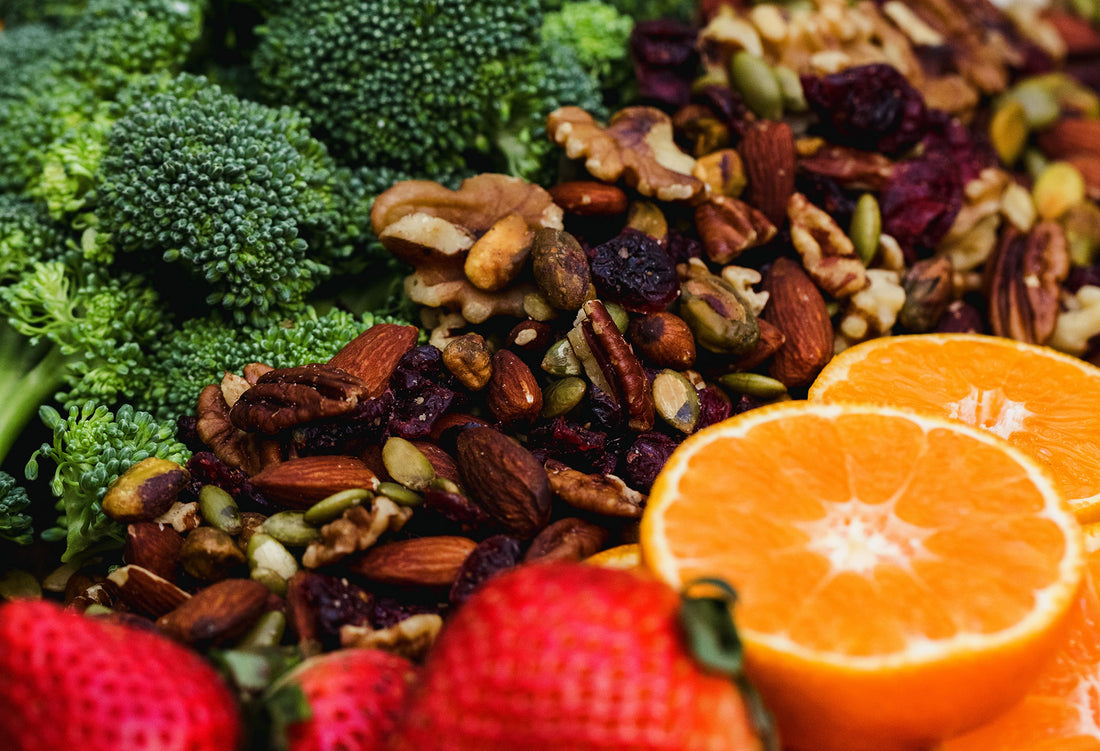It has long been known that vegetables and fruits play a particularly important role in healthy eating. However, is it possible to maintain a properly balanced diet in the everyday rush? Fortunately, there are ways to do this - and right now we are starting our journey through the issue of 5 portions of vegetables and fruit in practice. One… two… and three – welcome aboard our team of healthy eating enthusiasts.
What are the basics of a healthy diet?
Are you sure what a healthy diet should be based on? Varied meals based on high-value nutrients undoubtedly play an important role here. In everyday life, we don't even think about how important what we put on our plate is. However, subconsciously you probably feel that some foods serve you better than others. To reinforce this, let's remember a few golden rules of healthy eating:
- give up on monotony - your body needs many different ingredients, so the more varied the meals, the better,
- make sure that you get valuable nutrients from the food you eat - you need many vitamins, proteins and healthy fats every day,
- eat regularly and in quantities that will make you feel full instead of overeating,
- in the case of processed products , pay attention to the composition , if too much of the letter E appears there, it probably does not bode well.
Healthy eating habits are a great way to protect your body , strengthen its vitality and ensure the proper condition of your body and mind. Therefore, a properly balanced diet is nothing more than striving for the state of balance that our body loves so much.
The basics are already behind us, so it's probably a good time to move on to the next issue - the daily requirement for fruit and vegetables - here we go.
How much fruit and vegetables should you eat per day?
This question cannot be answered in one sentence. Healthy eating in practice means learning every day and adapting appropriate solutions to the needs of your body. Therefore, the exact need for specific products may differ between you and other people close to you.
Of course, don't think that we come empty-handed. You are in the right place for all enthusiasts of healthy eating and lifestyle. We also love absorbing knowledge and making our lives easier, so we perfectly understand your needs. We are all here to learn something and take better care of ourselves, so it's time to explain what a healthy diet is in practice.
A serving of vegetables – how much is it? Well, we hear everywhere about the need to include the right proportion of plants in the diet, but are you sure what amount we are talking about? As always, we are here to help you with nutritional issues - we should eat at least 5 portions of vegetables and fruit a day, of which one portion is approximately 80 g. We would like to remind you that this is a necessary basis, of course, nothing prevents you from in your diet was slightly higher. The situation is also slightly different in the case of vegetarians and vegans who do not consume meat or animal products (this does not apply to vegetarians). If you are on a plant-based diet, it is quite obvious that your diet will include more vegetables and fruits.
What about the nutrition of the youngest members of our family? What is the recommended serving of vegetables for children? The situation is similar here. Your child's daily meals should also include 5 such portions of fruit and vegetables. And what should there be more of? We recommend a ratio of vegetables to fruit of 3:2, but of course remember that it is not always necessary to strictly adhere to such guidelines. This is just an indicative list, so keep that in mind.
Okay, you already know what your daily portion of fruits and vegetables is, but why are these specific foods so important in a healthy diet? It's time for a short analysis of this issue, please read on.
Health benefits of eating vegetables and fruits
One of the main foundations of a healthy diet is to include products and meals with high nutritional value. This is where vegetables and fruits come into play, as they are a rich source of vitamins and other substances valuable to the body. Now let's focus on specific examples of products that can provide the most benefits to your health.
- Berry fruits such as raspberries, strawberries, blueberries, wild strawberries and blueberries are a valuable source of anthocyanins, which indicates anti-inflammatory and antioxidant effects.
- Green vegetables , including in particular: kale, green peas, broccoli, spinach and Brussels sprouts, provide the body with dietary fiber, flavonoids and carotenoids with antioxidant properties, and finally group vitamins and minerals, e.g. magnesium and potassium.
- Particularly noteworthy is also wild rose , which contains huge amounts of vitamin C, much higher than in the case of citrus fruits.
- A good vegetable source of vitamin C is red pepper , which also provides the body with folate, potassium and magnesium.
The examples of fruits and vegetables listed above have a very high nutritional value, so they should appear on your plate often. Of course, the world of plant foods is much more extensive and other products such as beans, soybeans, bananas or kiwi are also foodstuffs that you can use in everyday cooking. You probably remember very well that the key to a healthy diet is variety.
At this point, it is also worth mentioning a very interesting study, published in 2021 by the journal Circulation. The researchers collected health and diet information from dozens of studies around the world, involving about two million people who were followed for 30 years. It was found that compared to people who said they ate only two servings of fruit or vegetables a day, people who ate five servings a day had
- 12% lower risk of dying from heart disease or stroke
- 10% lower risk of dying from cancer
- 35% lower risk of dying from respiratory diseases such as chronic obstructive pulmonary disease
When to eat fruit?
Does the time of day you eat specific foods really matter more? We are already responding. Although there are many different positions on this topic, we would like to emphasize one of the most important things. Well, it's better not to eat fruit in the evening.
Here again - as in life - there are exceptions. If you happen to eat a few strawberries in one evening, there is absolutely no reason to panic, even in a healthy diet there is room for various types of deviations . But why do we not recommend eating fruit regularly late in the day? This particular type of food sometimes contains more or less sugar, which can be stored in our body in the form of fat tissue. Moreover, glucose is responsible for stimulation, and the evening or night is a time to calm down and calm down the body and prepare it for sleep - so it is best if you respect its need for regeneration.
So what times of the day can you eat fruit? This type of food is perfect for, among others: as an addition to breakfast - e.g. oatmeal. We also emphasize that it is better not to eat fruit after a large meal , it is best to wait a while and eat it as a small snack.
We return to the topic that seems to be the most popular in a busy world - how to make a diet practical and healthy at the same time . We assure you that it really is possible to reconcile it, you just need to remember a few small things, so we will discuss them in a moment.
How to eat more vegetables and fruit?
It might seem that this is a lot, after all, who can actually eat as many as 5 portions of vegetables and fruit a day - however, recipes for nutritious meals do not have to be that difficult.
If, like us, time is highly valued in your kitchen, it is a good idea to introduce more functional solutions into your everyday cooking. Do you think that peeling and washing fruit is often just an unnecessary activity that significantly lengthens the process of preparing a meal? Fortunately, it doesn't have to last forever! One of our little kitchen secrets is frozen fruit . This particular method of extending the shelf life of food products protects them against the loss of many valuable nutritional properties. Therefore, there is nothing to worry about, and the cooking itself takes much less time.
Another point that you can easily introduce into your eating routine is quick snacks of fruit and vegetables . Small and healthy treats are easy to take with you to work, university or simply snack on them at home between meals. Wash the strawberries, cut the apple or carrots and celery and eat them, we guarantee that it will be delicious. After all, it's better to have such snacks on hand than highly processed products.
Freeze-dried food is another solution that greatly facilitates the preparation of meals in the kitchen. The great advantage of this method of preserving products is a significant extension of their shelf life. Moreover, freeze-dried products do not lose their valuable nutritional properties and their characteristic taste, and preparing a meal with them will take you very little time.
The impact of diet on health is a topic that we could develop endlessly. We are very glad that you managed to be here with us today and go through all these issues that have so far been covered with a shadow of doubt. We are very proud of how well you fit into the world of healthy eating and we are pleased that we can discover new topics for you. Until next time!
Bibliography:
- https://www.nhs.uk/live-well/eat-well/5-a-day/portion-sizes/#:~:text=Everyone%20should%20have%20at%20least,fruit%20and%20vegetables% 20a%20day .
- https://www.health.harvard.edu/nutrition/how-many-fruits-and-vegetables-do-we-really-need
- https://www.ahajournals.org/doi/10.1161/CIRCULATIONAHA.120.048996
- https://ncez.pzh.gov.pl/abc-zywienia/Czas-najlepiej-spozywac-owoce/#:~:text=Zgo%20z%20zaleceniami%20%C5%9Awiatowej%20Organyzacji,tym%20lepiej%20dla% 20our%20health .
- https://www.ncbi.nlm.nih.gov/pmc/articles/PMC4644575/
- https://www.sciencedirect.com/science/article/abs/pii/S0195666313000652?via%3Dihub


